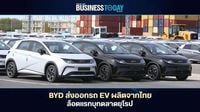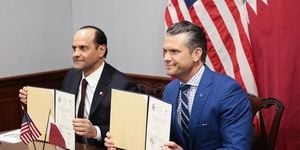On August 25, 2025, the Chinese electric vehicle giant BYD made waves in the automotive world with a pair of milestone announcements: not only did the company confirm that sales of its BYD Dolphin model had surged by an astonishing 200% compared to previous periods, but it also revealed that its Thai manufacturing plant had shipped the first batch of Dolphin EVs—over 900 units—directly to Europe. This dual achievement underscores BYD's rapidly expanding global footprint and the pivotal role Thailand now plays in the international electric vehicle supply chain.
According to data provided by the Center for China & Globalization and CNBC, BYD's Dolphin sales hit 900,000 units, marking a dramatic leap in the company's performance and signaling a broader shift in the global electric vehicle (EV) market. This 200% spike in sales is more than just a number; it's a testament to the growing appetite for EVs worldwide, especially as automakers and governments double down on their commitments to clean energy and reduced emissions. In the first half of 2025 alone, BYD reported a 90% increase in overall sales, and its market share in the EV segment climbed by 76%, painting a picture of a company in the midst of a meteoric rise.
What’s behind this surge? For starters, BYD’s aggressive expansion strategy has paid off, particularly with the Dolphin model. The company’s ability to ramp up production and meet soaring demand has set it apart from competitors. But there’s more to the story: the recent shipment of Dolphin EVs from BYD’s Thai plant to Europe is a strategic move that highlights both the company’s international ambitions and Thailand's emerging role as a regional manufacturing powerhouse.
The shipment, carried out via BYD’s dedicated vessel, the BYD ZHENGZHOU, marked the first time vehicles produced in Thailand were exported directly to key European markets such as the United Kingdom, Germany, and Belgium. As reported by Xinhua, this milestone represents a major step forward for BYD’s global supply chain and further cements Thailand’s status as a critical hub for EV manufacturing and export in Southeast Asia.
Phanthorn Wongphrom, Director of the Investment Promotion Division 4 at Thailand’s Board of Investment, emphasized the significance of BYD’s decision to use Thailand as an export base for Europe. "BYD's move to export electric vehicles from Thailand to Europe demonstrates the strong economic connectivity between Thailand and international markets. The Thai government will continue to promote and support such investments to enhance domestic value chains, boost technological capabilities, and strengthen Thailand's position in the global EV industry," Wongphrom stated, according to Xinhua.
Yupin Boonsirichan, Chair of the Automotive Industry Group at the Federation of Thai Industries, echoed this sentiment, noting that the milestone reflects BYD’s deep confidence in Thailand and underscores the country’s growing importance in the global EV supply chain. "This milestone highlights BYD's strong confidence in Thailand and reinforces the country's importance in the global electric vehicle supply chain. It also emphasizes Thailand's capability to become a global connector in EV manufacturing and export," Boonsirichan said.
Ke Awipin, General Manager of BYD Thailand, described the export of Thai-made Dolphins to Europe as a significant achievement, coming on the heels of BYD delivering its 90,000th new energy vehicle in July. "The export of the Dolphin model produced in Thailand to Europe for the first time is not only another step in BYD's global expansion strategy but also reinforces Thailand's crucial role in the global EV supply chain," Awipin remarked. He pointed out that the Rayong factory, which serves as BYD’s Thai production base, is now a vital link in the company’s global manufacturing network, integrating domestic supply chains and showcasing BYD’s advanced manufacturing expertise.
BYD’s Thai plant does more than just meet local market demand—it’s become a launchpad for exports to Europe and beyond, strengthening Thailand’s position as a strategic center in the worldwide EV industry. This is a remarkable transformation for a country that, just a decade ago, was primarily known for assembling combustion-engine vehicles for Japanese automakers. Now, Thailand is emerging as a linchpin in the global transition to clean mobility.
Meanwhile, on the global stage, the electric vehicle industry is navigating a complex web of trade dynamics, as highlighted by recent tensions between the United States and China. On August 25, 2025, U.S. President Donald Trump threatened to impose a 200% import tariff on Chinese goods if China restricted the export of rare earth magnets, a critical component in EV production. "They have to give us the magnets. If they don’t, we’ll have to impose a 200% import tariff or something like that," Trump told reporters after meeting with South Korean President Lee Jae-myung at the White House, as reported by Bloomberg.
Trump’s remarks came at a delicate moment: the 90-day truce in the U.S.-China trade war was at risk of collapsing before its scheduled expiration in November. Although Chinese exports of rare earth magnets had rebounded to pre-restriction levels, with shipments to the U.S. in June jumping 660% month-on-month and July volumes up 76%, the underlying power struggle over critical minerals remains unresolved. China currently controls about 90% of the world’s rare earth magnet supply, giving it significant leverage in trade negotiations, especially as the U.S. relies heavily on these materials for sectors such as automotive, electronics, and renewable energy.
Henry Wang, founder and president of the Center for China & Globalization, cautioned against reading too much into Trump’s threats, suggesting the real test would be whether both sides could implement their agreements. Alfredo Montufar-Helu, managing director at GreenPoint, noted that the future of the trade truce would hinge on continued bilateral cooperation, with upcoming talks between Chinese and American trade negotiators potentially paving the way for higher-level discussions and lasting solutions.
During the ceasefire, both nations agreed to a framework that included China easing restrictions on rare earth exports and the U.S. lifting certain technology export bans. The U.S. also reduced tariffs on Chinese goods to around 55%, while China lowered its tariffs on American products to 32%, according to CNBC. These steps, while tentative, signal a mutual recognition of the need for cooperation in a globalized supply chain—especially as electric vehicles and clean technologies become ever more central to the world economy.
For BYD, these global currents present both opportunities and challenges. Its remarkable sales growth and expanding international reach are clear indicators of the company’s momentum. Yet, as trade tensions simmer and the competition for critical minerals intensifies, the road ahead will require nimble strategy and continued innovation.
With its Dolphin model now a fixture in showrooms from Beijing to Berlin, and its Thai factory shipping EVs across continents, BYD is not only reshaping the electric vehicle landscape—it’s also helping to redefine how and where the cars of the future are made.




